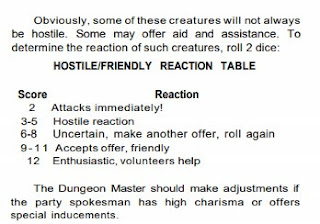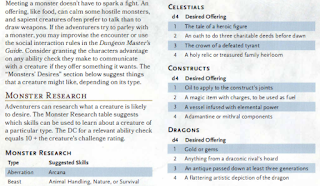One of the most unforgiveable things that mainstream D&D has ever done was to make Diplomacy a skill.
Weapon skills and knowledge skills, sure. We can't model sword fights around the kitchen table unless we bust out the boffers, but talking to monsters? All you need are words.
Talking is just about the only thing that we can model perfectly, where the player and the player character are actually doing the same thing at the same time. And I'm especially interested in parley, which is when you encounter something that would normally be a combat encounter, but you end up talking to it instead.
It's also a very rewarding part of gameplay. Brokering a hostage exchange. Proving yourself to a band of orcs. Lying to a dragon in order to sneak around his hoard. It would be very anticlimactic to reduce Bilbo's interaction with Smaug to a couple of deception rolls, wouldn't it?
History of Reaction Rolls
Modern D&D doesn't usually bother with reaction rolls. They leverage the social rolls (Persuasion, Intimidation, Deception, Insight) instead. The modules that I've read are pretty scripted. Either an encounter is a fight or it isn't, and if there's any ambiguity, it's settled with one of those 4 rolls. Which is honestly fine, since 5e is more comfortable being a miniatures wargame than anything else.
But reaction rolls have a long history in D&D, dating back to the very first edition of D&D back in '74 (this is Original D&D, not 1st edition).
Here's Holmes version from Basic D&D in '77.
 |
from Holmes
Notice that this seems to be something that is rolled as a reaction to an offer made by the players ("make another offer") rather than something that is rolled as soon as the monsters catch sight of you. Perhaps the default assumption was that intelligent monsters would usually talk first, then only attack if they had good reason to (or no reason not to). |
So yes, the players would sometimes randomly encounter huge groups of orcs, but they wouldn't always be hostile. There would frequently be a lot of talking first.
Modern D&D is sort of rediscovering all this old stuff. But before we use it, it's good to understand why we want in our games in the first place?
Why Parley?
Most OSR games have reaction rolls. Not every band of orcs is immediately hostile
1. It let's the players see more of the world.
The game is a lot more interesting when you're not trying to kill everything all the time. As a DM, you're constantly creating interesting cultures, factions, and sidestories--all of which becomes pointless if the orcs attack as soon as they see the PCs.
2. It lets you throw more dangerous enemies at the players.
A level 1 party might be able to handle a level 4 ogre who suddenly attacks BUT the same level 1 party might also be able to handle a level 8 giant who is easily tricked.
This is how a lot of older games were able to get away putting "10-100 bandits" on the map. The party can lie to them, get them to go into a cave, and then collapse the cave. Or the party could avoid combat all together.
You can throw anything in the Monster Manual against level 1 parties if you remove the "attacks the party immediately" assumption from it. A bunch of level 1s can walk into a dragon's hoard, talk to it, and then leave when it threatens to eat them. (If they want to keep fucking with the dragon--that's on them. My point is that making an encounter less immediately hostile gives you a lot more flexibility in the types of threats you can throw at players.
3. It opens up a lot more tactical options.
What's more interesting? A game with exciting combat? Or a game with exciting combat AND tense negotiations?
When you can defeat a dragon with clever words or powerful weapons, you now have more strategies that the players can employ. Their toolbox is bigger, and so is the game.
So What's the Downside?
Good parley is hard. It relies a lot of DM skill. Honestly, I'm not that great at it myself. Others do it better.
Parley (and high-stakes negotiation in general) has slowly been phased out of D&D because (1) it is hard to reduce it to a procedure (something with points and DCs) and (2) when a DM is bad at it, it makes the game feel arbitrary and unfair.
Modern D&D has worked hard to make the game feel less arbitrary. You'll hear players complaining about "DM fiat"--this is what they're talking about.
At it's worst, it can sound like:
"A bunch of orcs showed up, said that they would help us kill a worm, and then ganked us from behind when the purple worm showed up."
or
"The dragon just demanded treasure, and when we didn't have any, it breathed fire on us."
or
"Nothing we said to the guards worked. We tried bribing them, threatening them. But they DM said that they were too disciplined for that. So we wasted half an hour talking to them, then ending up fighting them anyway."
How to Handle Parley Well
Running reaction rolls is challenging for a new DM, but it is something that you get better with at practice. And it's a skill worth honing, for all the reasons above.
First, parley isn't any different from other OSR concepts.
1. Dangers Need to be Telegraphed
If someone is a shifty scumbag will betray you--that needs to be telegraphed. The greater an NPCs ability to fuck you over, the clearer their nature needs to be.
This is partially why Elden Ring can get away with being so difficult. There's a huge honking dragon in front of you and you know it's going to wreck your shit. But the game doesn't make you fight the dragon--you could just walk away. So when your screen goes red, it's because you read the Terms and Conditions and then hit Accept.
Your players might not care much if Suzy the Pickpocket steals 3 silver coins without warning, but they tend to care a lot if their loyal friend Honorable Dalgar suddenly stabs them in the back. (This is why so many DM-orchestrated betrayals fall flat.)
2. Follow Good OSR Problem Design
Reposting from here:
- No obvious solution. (Rolling Persuasion/Intimidation/Deception is always obvious.)
- Many possible solutions.
- Solvable via common sense (as opposed to system mastery, or a high stat).
3. Monsters Need to be Understandable
There's a reason why old-school dungeons sometimes spend half a page explaining exactly how a trap functions. It's because players pried up the floor tiles and jammed metal rods in the mechanism, and the DM needs to be able to adjudicate if that works or not.
Same thing applies to the monsters and NPCs that the players encounter.
If the goblins are greedy, the players need to know that. If the Queen of Flowers always keeps her word, same thing.
These things help the players come up with strategies. Their brains are the mechanisms, but if they don't understand them, the players don't know where to jam the metal bar. I urge you to give your players a high-information game. There's nothing stopping you from saying "you've heard many tales of how honorable the Queen of Flowers is" if you can't think of a better way to impart the info.
I know it might seem tempting to have honorable characters suddenly betray the party, or to have characters with mysterious motivations. Those things work fine in books and in scripted adventure paths--they don't work well in negotiations where players expect to have some agency.
And let me be clear: monsters don't have to have human psychology. (In fact, I think it's more fun when they don't.) They might want things that a human never would, and ignore things that a human never would. They should be alien, but not incomprehensible.
Do I Have to do Funny Voices?
No, you don't have to do funny voices. Neither do your players.
Everyone needs to be clear about what they're communicating though.
If your player says "I'm going to threaten the orc chieftain" then you need to prompt them with "what is your threat, exactly?" These details are how the negotiation proceeds.
Similarly, you don't need to be good at Persuasion in real life to roleplay a character who is good at persuading. You just need to be able to approach negotiations like any other puzzle.
 |
| from Dai Dark by Q Hayashida |
The Basics
Everyone you run into in a dungeon is going to want something. As as DM, you should have an idea of what this is when you start the roleplay.
Even with a neutral or positive reaction roll, the NPCs are still going to ask who you are and what you're doing there. Likewise, the NPCs/monsters need to have an answer to those questions, too.
Beyond that, you should have an idea of what the NPC/monster wants. This is what drives the conversation. For a lot of normally-hostile NPCs, there's also a third question: why shouldn't we kill you?
Unless the enemies are fighting in defense of their families or homes, there's little motivation to fight to the death. Even a random gang of orcs in a dungeon is more likely interested in looting than they are in risking their lives trying to kill the players, unless the players look weak, or if they have something the orcs want.
But also remember that monstrous denizens have monstrous desires. They may only accept a promise rom the party if the party accepts a disease from them, or if the two groups exchange a slave. (Nevermind that the PCs don't have a slave.) These desires unreasonable, but they are still actionable. Perhaps they would accept the donkey as a slave?
The demands of the monsters should be challenging to meet. This negotiation is a replacement for combat (sort of). A challenging combat should be replaced with a challenging demand. One shouldn't be easier than the other, because we don't want any easy decisions in an OSR-style challenge. The drow are impressed by your wizard's magic and will let you pass, provided you seal the deal by exchanging slaves--or would the players rather kill these weirdos?
What Do Monsters/NPCs Want?
I recommend picking the thing from this list that makes the most sense, and then roll for another one randomly.
- Information (usually about the dungeon itself, such as maps)
- Treasure (gold! but alternatively: magic items, weapons, or slaves)
- Food (we're hungry)
- You to leave (now)
- You to come (meet our leader)
- Violence (we can't kill this thing alone)
- Entertainment (a duel or a game of skill--we're bored and want to wager something)
- Help (with something in a dungeon: e.g. open this weird door for us)
- Honor (defeat me in a duel)
- Shame (lick our boots)
A surprising amount of players would rather fight to the death than have their imaginary elf lick a imaginary goblin's imaginary boots.
And of course, remember that people ask for more when they think they're negotiating from a position of strength. If the orcs outnumber you 10 to 1, they're a lot more likely to demand your total surrender than when it's 2 to 1.
And remember to keep the pressure on the players. If they take too long to speak up, the NPCs should become impatient. Are you wasting our time? Are you stalling while your reinforcements creep up on us? (Also remember to roll for random encounters if the negotiation drags on too long. A wandering monster is always a fun complication.)
Lastly, remember that the players can demand all of those things from the NPCs as well. Draw us a map, orcs! There's gold in it for you if you can.
Handling a Stalemate
What to do if neither side seems willing to budge? Does it then turn immediately to combat?
- Yes, "the orcs become impatient and attack" is always an option. It shouldn't be your first resort, though, since this ends the negotiation.
- You can give the players a small victory now and up the stakes later. The orcs can retreat, after vowing that they'll come back and kill everyone. (And indeed they might come back with reinforcements if the players linger here.)
- The two parties can agree to leave each other alone. Feel free to propose a hostage exchange at this point. "If we ambush you, you can kill Grok. If you ambush us, we'll kill your linkboy. Meet us at the tree outside at sundown and we'll exchange back."
- Alternatively, switch demands, with either higher or lower stakes. "Naw, we were just kidding! You should have seen the look on your face! You can keep your torch boy. But come on--don't just waste our time. Let's play a game. A friendly wager."
Information and Faction Mastery
Dungeon Mastery is when players spend a few sessions in a dungeon and learn how to use the traps to their advantages, how to use shortcuts to ambush enemies, where to hide safely so there's no random encounters, etc. If you learn how to operate the portcullis, you can lure the giant snake over and pin it to the floor. A well-designed dungeon allows players to "tame" it, at least partially.
Similarly, exposure and experience should allow a
- If you know their objectives, you can lie to them better.
- If you know some of their names, you can leverage that for intimidation or deception. ("We killed Gundarr. He was a lot bigger than you.")
- If you know who their boss is, that information can also be turned into intimidation or deception. ("Big Chokka sent us. We're supposed to guard the hidden door. Can you show us where it is?")
- If you took prisoners, they are now hostages that can be ransomed back.
- If you know their costumes and disguises, you can impersonate them.
- If you learn what they are afraid of, you can threaten them with it.
- If you learn more about the dungeon, you can also craft better lies (or truths, if needed). For example: "You saw the dead worm downstairs? We were the ones who killed it."
Experience is my preferred way for the players to "get good" at negotiation. It's a satisfying way to win an encounter without drawing your sword, and it rewards clever, attentive players.
When in Doubt
Roll dice.
There's no hard mechanics for this. (And you shouldn't attempt to make one. Negotiation is too complicated for dice and too easily modeled with real conversation.)
Your best friend is a d6. I recommend stating the odds out loud to your players, then rolling the die in plain sight.
"The chieftain looks you up and down. He's having a hard time imagining you beating Gundarr in a fair fight. I'm going to roll a d6. If it's a 1 or a 2, he believes you. Before I do, is there anything you want to do to seem more convincing?"
This part is important. You want player buy-in. If the orcs attack you on the next round, it shouldn't feel like DM fiat. It should feel like the results of a decision that the players made.
Perfectly Competent Foes are Boring
Consider sneaking onto the Travis Air Force Base in California. If the guards catch you, they're going to arrest you--no need for a reaction roll. There isn't much variation if the guards are trained, loyal, intelligent, equipped, confident, and at full strength.
So, when you run into the cultists guarding the lower levels, consider making them (d6):
1. Untrained and uncertain. Maybe this is their first time encountering someone else down there. Maybe they didn't think that anyone else would ever come down here.
2. Unmotivated or disloyal. Maybe they resent this situation. They don't really want to be guards. They might disagree with their leader, or they might not care about the larger objective. They may offer safe passage in exchange for gold ("It's like I never saw you.") They may be more interested in personal goals: an honorable duel instead of a fight to the death.
3. Stupid, or least making an error. When they catch sight of the PCs, they look confused and ask "Are you Uxamog the Defiler? You're one day early." Deceiving the monsters is always a possibility, but some enemies make it extra-easy. (You'll still need a plan for when they escort you to their leader, though.)
4. Unequipped. Maybe this guy stepped away from the rest of the patrol on a bathroom break, or they left their swords somewhere else, not expected anyone here.
5. Unconfident. Noticeably reluctant to fight. Perhaps they're cowards, perhaps something has just happened that has shaken their faith.
6. Wounded or Weakened. They could be dealing with another incident, perhaps even carrying a wounded person back to their barracks. They could be drunk, or sick with something.
This d6 table also functions as a list of excuses for "why these guys aren't attacking us right now".
Adapting to 5e
You sorta can't.
5e is more focused on character-building synergies and tactical combats. That's where the fun is in 5th edition. (5e is not a bad game. It accomplishes most of what it sets out to do.)
But having said that, 5e has mostly stripped away the mechanics that make parley possible, and it's not well-supported by the published modules.
Having said that, here's my best ideas.
System Support
- Add wandering monster checks
- Add reaction rolls
- Remove Persuasion, Intimidation, and Deception
The third option is pretty unpalatable to most players. What if I want to be a high-charisma Bard who is good at lying to people? You could conceivably take a hybrid approach, where you raise the DCs by a good amount (maybe 8 points) and give players a hefty bonus to the social rolls (+4 to +10) based on the strength of your argument.
The bard is still the one doing all the talking, but at least it's less about the numbers on your sheet and more about what is being said.
Also note that you don't need wandering monsters or reaction rolls to introduce parley gameplay. Honestly, the easiest way to ease yourself (and your players) into this playstyle is to just create scripted encounters that support parley. Example:
Grog the ogre guards the front gate. He is bored and doesn't take his job seriously. He doesn't think anyone is stupid enough to challenge his boss. However, he will defend the place in earnest (including yelling for reinforcements) if he thinks there is an actual danger to the cult.
And then see how your party does at talking to the ogre. Replace the ogre with something bigger if needed--you want the monster to be big enough that your players will hesitate jumping into a straight fight, and start thinking about more creative solutions.
Group Support
If you're going to be changing your game away from the base 5e, you may be changing it away from the expectations of your group. Talk to them about this potential change, get their input.
Caution them that parley gameplay isn't always more satisfying, and requires more effort from both the DM and the players.
Adventure Design
- Get used to players "skipping" combats
- Use factions
5e is built around keystone combat encounters. Are you comfortable with your players bypassing them?
And parley gameplay is closely linked to faction play. If most of the enemies in your dungeon aren't linked together, consider replacing the encounters with monsters that are linked (speak the same language, have the same goals, know each other).
Tasha's Cauldron of Everything
Don't use the parley rules in Tasha's. They're terrible.
The list was constructed without any thought for how it fits into the game. Most of the items are trivially simple "the tale of a heroic figure" or an entire side adventure "the crown of a defeated tyrant".
Monsters should desire things that are (a) difficult/painful to grant, but at least immediately possible, and (b) linked to the current situation at hand.
As a list of potentially interesting encounters, though, it's not bad. Treants that want you to break your axes, sun-proofing a mausoleum for an undead, etc.














